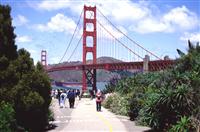 THE TOURISM INDUSTRY
THE TOURISM INDUSTRY
Tourism has become a major recreation pursuit and and a worldwide commercial industry. It is so significant today that the economies of some regions (even some countries) are more heavily dependant upon tourism than anything else.
The tourism industry encompasses the provision of all those services used by people when travelling away from home, including booking services, transport, accommodation, tourist retail outlets and attractions.
Worldwide millions of people are employed in the tourism industry – from coach drivers to travel agents to hotel concierges, as well as all the other hundreds of occupations that cater for tourists and travellers.
Tourists travel to almost every country in the globe, looking for adventure, recreation and entertainment. They seek both new and familiar experiences, both close to home and far abroad. Some travel independently, others in organised groups. Some look for security, others prefer their travel spiced with excitement and danger.
Tourism is never static – almost more than any other industry, tourism is affected by such things as natural disasters, political instability and economic downturns. Adverse circumstances such as a tsunami or civil conflict in one area can lead to a boom in another, safer area. More predictably, the tourist industry is also affected by seasonal swings – with thousands of tourists visiting favoured destinations in the ‘high’ or peak season then abandoning them in droves during the ‘low’ season.
Anyone involved in the travel and tourism industry needs to be prepared for such changes. They must also have excellent product knowledge, including knowledge of their customers, the services the customers will use, and the destinations they will travel to.
Tourism Industry Sectors
Tourists travel to destinations. They need transport systems to get to their destinations and once there, they require accommodation, entertainment (or ‘attractions’) and other amenities (eg. shops, garages, medical facilities).
The tourism industry is comprised of sectors that deal with the tourist’s needs. Sectors include:
- Marketing specialists – travel agents, tour wholesalers and tourism promotional agencies
- Carrier or transport services – including rail, coach, airlines and shipping services
- Accommodation sector – including hotels, resorts, motels, campgrounds, B&Bs, caravan parks, restaurants and cafes
- Attractions sector – including theme parks and other tourist-oriented entertainment facilities
- Tour operators – tourism guides, tour group leaders, drivers and hosts
Some sectors overlap; others operate independently. For example, a large tourism resort might offer accommodation, attractions, tours and marketing services, while a travel agent is likely to be only involved in the marketing sector.
Broadly there are three types of tourism systems in each country:
a) Local or domestic tourism – residents travelling within their own country, including short-distance day and weekend trips, excursions within the state or region, and interstate or long-distance travel within the country
b) Outbound tourism – residents travelling abroad
c) Inbound tourists – tourists visiting from another country
Many organisations specialise in one or two tourism systems; for example, a government-sponsored tourist authority caters for inbound and domestic tourists, but not outbound tourists.
COURSES
See http://www.thecareersguide.com/product_listings.aspx?catid=Hospitality